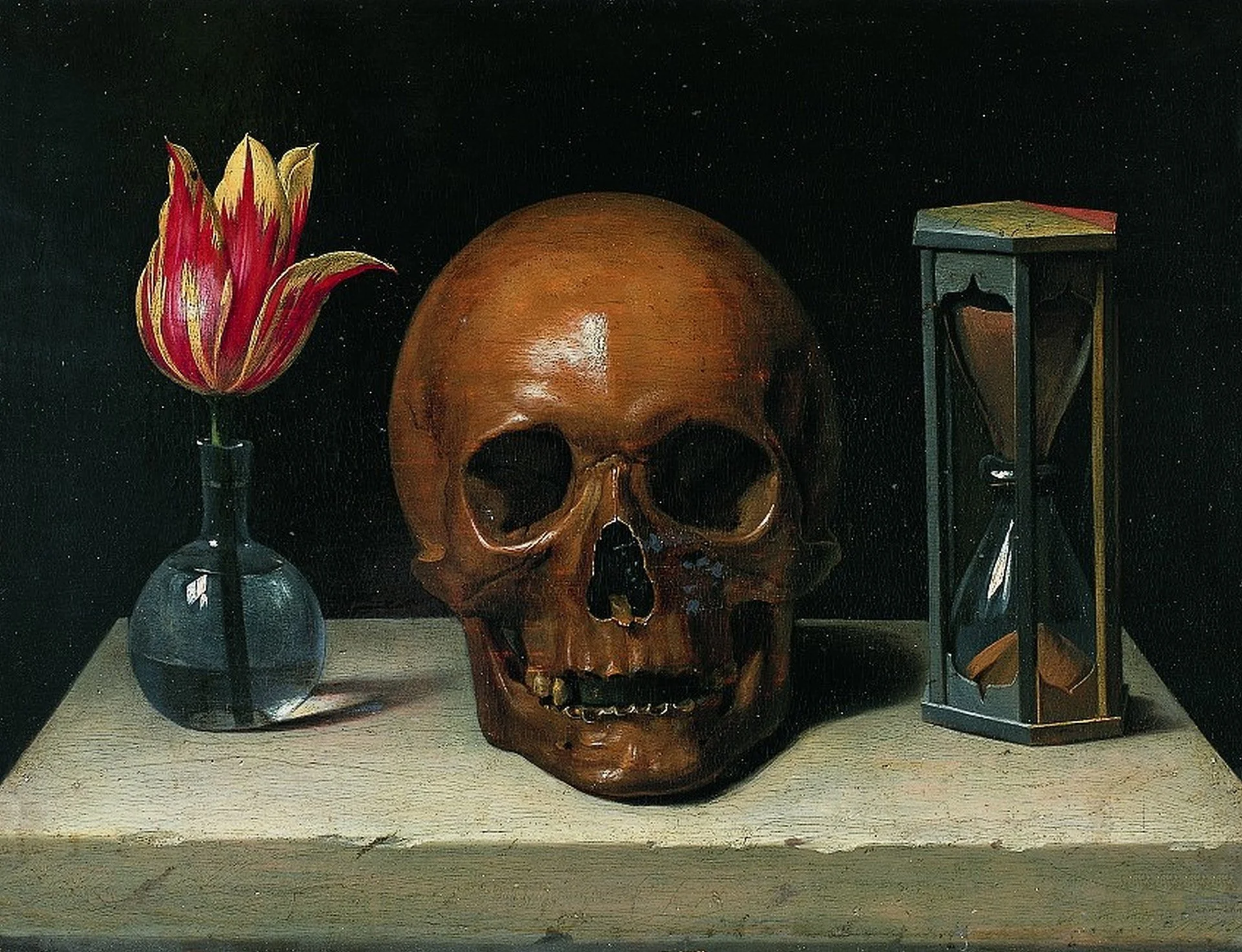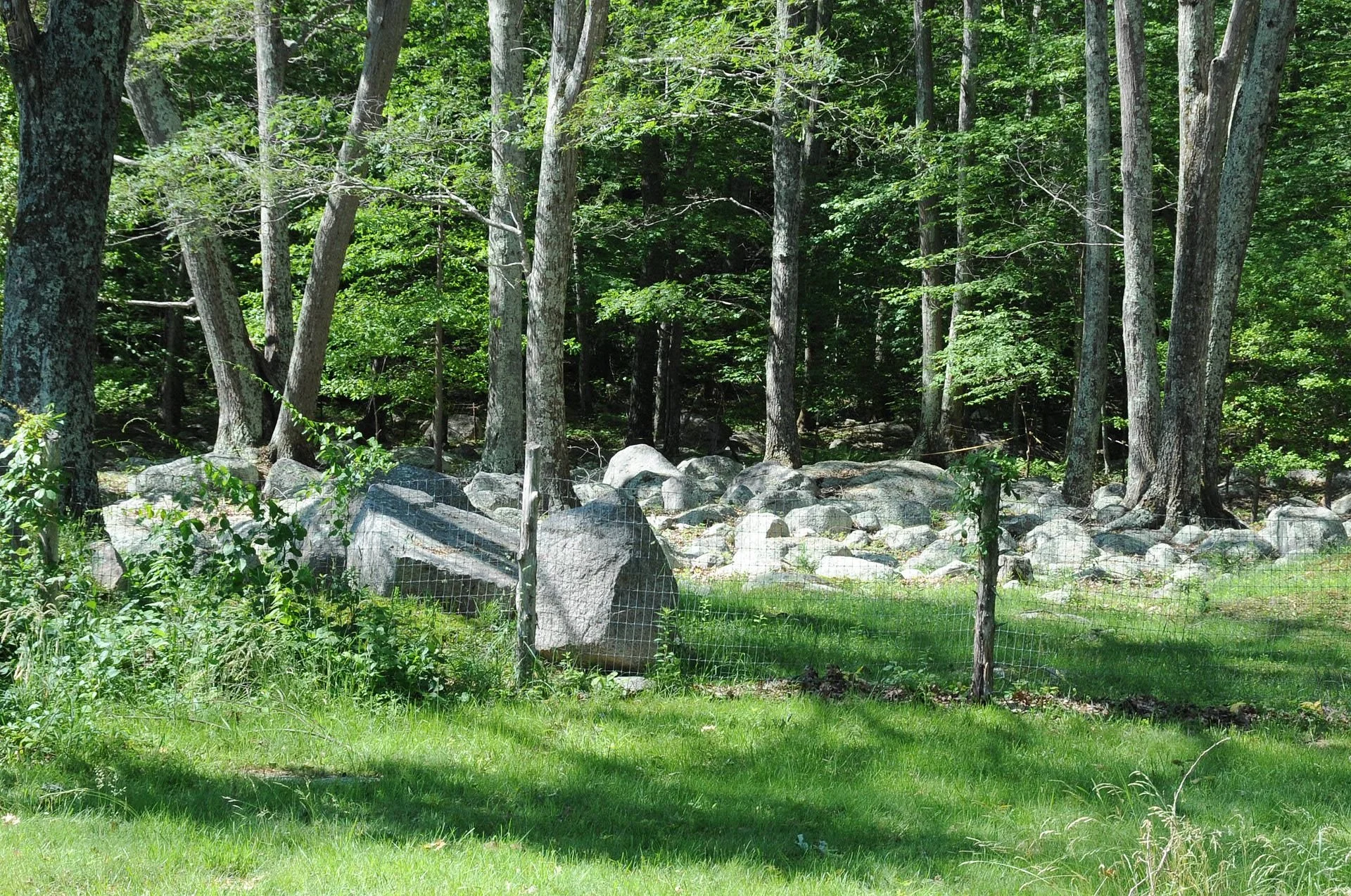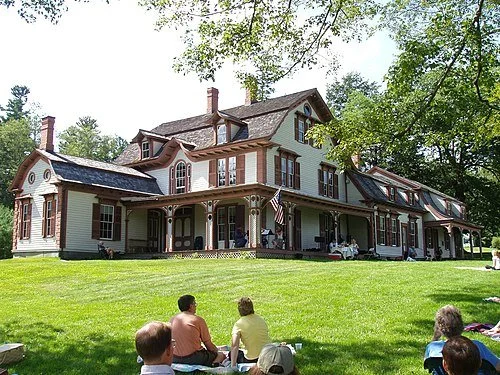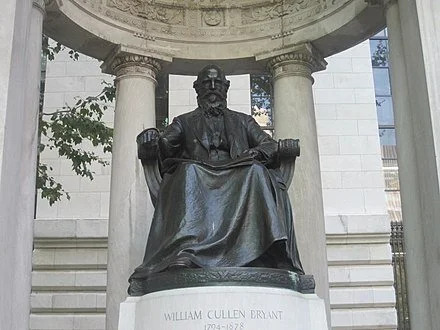
It's not all that bad
A flower, a skull, and an hourglass stand for life, death and time in this 17th-Century painting by Philippe de Champaigne.
To him who in the love of Nature holds
Communion with her visible forms, she speaks
A various language; for his gayer hours
She has a voice of gladness, and a smile
And eloquence of beauty, and she glides
Into his darker musings, with a mild
And healing sympathy, that steals away
Their sharpness, ere he is aware. When thoughts
Of the last bitter hour come like a blight
Over thy spirit, and sad images
Of the stern agony, and shroud, and pall,
And breathless darkness, and the narrow house,
Make thee to shudder, and grow sick at heart;—
Go forth, under the open sky, and list
To Nature’s teachings, while from all around
Earth and her waters, and the depths of air—
Comes a still voice—Yet a few days, and thee
The all-beholding sun shall see no more
In all his course; nor yet in the cold ground,
Where thy pale form was laid, with many tears,
Nor in the embrace of ocean, shall exist
Thy image. Earth, that nourished thee, shall claim
Thy growth, to be resolved to earth again,
And, lost each human trace, surrendering up
Thine individual being, shalt thou go
To mix for ever with the elements,
To be a brother to the insensible rock
And to the sluggish clod, which the rude swain
Turns with his share, and treads upon. The oak
Shall send his roots abroad, and pierce thy mould.
Yet not to thine eternal resting-place
Shalt thou retire alone, nor couldst thou wish
Couch more magnificent. Thou shalt lie down
With patriarchs of the infant world—with kings,
The powerful of the earth—the wise, the good,
Fair forms, and hoary seers of ages past,
All in one mighty sepulchre. The hills
Rock-ribbed and ancient as the sun,—the vales
Stretching in pensive quietness between;
The venerable woods—rivers that move
In majesty, and the complaining brooks
That make the meadows green; and, poured round all,
Old Ocean’s gray and melancholy waste,—
Are but the solemn decorations all
Of the great tomb of man. The golden sun,
The planets, all the infinite host of heaven,
Are shining on the sad abodes of death,
Through the still lapse of ages. All that tread
The globe are but a handful to the tribes
That slumber in its bosom.—Take the wings
Of morning, pierce the Barcan wilderness,
Or lose thyself in the continuous woods
Where rolls the Oregon, and hears no sound,
Save his own dashings—yet the dead are there:
And millions in those solitudes, since first
The flight of years began, have laid them down
In their last sleep—the dead reign there alone.
So shalt thou rest, and what if thou withdraw
In silence from the living, and no friend
Take note of thy departure? All that breathe
Will share thy destiny. The gay will laugh
When thou art gone, the solemn brood of care
Plod on, and each one as before will chase
His favorite phantom; yet all these shall leave
Their mirth and their employments, and shall come
And make their bed with thee. As the long train
Of ages glide away, the sons of men,
The youth in life’s green spring, and he who goes
In the full strength of years, matron and maid,
The speechless babe, and the gray-headed man—
Shall one by one be gathered to thy side,
By those, who in their turn shall follow them.
So live, that when thy summons comes to join
The innumerable caravan, which moves
To that mysterious realm, where each shall take
His chamber in the silent halls of death,
Thou go not, like the quarry-slave at night,
Scourged to his dungeon, but, sustained and soothed
By an unfaltering trust, approach thy grave,
Like one who wraps the drapery of his couch
About him, and lies down to pleasant dreams.
— “Thanatopsis,’’ by William Cullen Bryant (1794-1878), American romantic poet and famed New York-based editor. He grew up in western Massachusetts.
‘Through deep impartial woods’
Remains of stone walls in Exeter, R.I.
— Photo by JERRYE & ROY KLOTZ, M.D.
“What is it for, now that dividing neither
Farm from farm nor field from field it runs
Through deep impartial woods, and is transgressed
By boughs of pine or beech from either side?”
— From “A Wall in the Woods: Cummington,’’ by American poet Richard Wilbur (1921-2017)
It’s highly unusual in the U.S. for a government seal to feature a literary figure. Cummington honors its native son William Cullen Bryant (1794-1878), a romantic poet, journalist and long-time editor of the New York Evening Post.
William Cullen Bryant Homestead, in Cummington, part of the Massachusetts park system.
William Cullen Bryant Memorial in Bryant Park, Manhattan, next to the New York Public Library’s main building.
'Lone wandering, but not lost'
“Wood Duck (1915), by Chester A. Reed, from The Bird Book
Whither, midst falling dew,
While glow the heavens with the last steps of day,
Far, through their rosy depths, dost thou pursue
Thy solitary way?
Vainly the fowler's eye
Might mark thy distant flight to do thee wrong,
As, darkly painted on the crimson sky,
Thy figure floats along.
Seek'st thou the plashy brink
Of weedy lake, or marge of river wide,
Or where the rocking billows rise and sink
On the chafed ocean side?
There is a Power whose care
Teaches thy way along that pathless coast,—
The desert and illimitable air,—
Lone wandering, but not lost.
All day thy wings have fanned,
At that far height, the cold, thin atmosphere,
Yet stoop not, weary, to the welcome land,
Though the dark night is near.
And soon that toil shall end;
Soon shalt thou find a summer home, and rest,
And scream among thy fellows; reeds shall bend,
Soon, o'er thy sheltered nest.
Thou'rt gone, the abyss of heaven
Hath swallowed up thy form; yet, on my heart
Deeply hath sunk the lesson thou hast given,
And shall not soon depart.
He who, from zone to zone,
Guides through the boundless sky thy certain flight,
In the long way that I must tread alone,
Will lead my steps aright.
— “To a Waterfowl” (1818), by William Cullen Bryant (1794-1878), a western Massachusetts native who moved to New York City and became a major American literary figure
William Cullen Bryant: 'An image of that calm life'
Green River Park along the river of the same name, in Greenfield, Mass.
The Green River is a tributary of the Deerfield River, in southern Vermont and northwestern Massachusetts. William Cullen Bryant (1794-1878), a romantic poet, journalist and long-time editor of The New York Post, grew up in nearby Cummington.
Green River
When breezes are soft and skies are fair,
I steal an hour from study and care,
And hie me away to the woodland scene,
Where wanders the stream with waters of green,
As if the bright fringe of herbs on its brink
Had given their stain to the wave they drink;
And they, whose meadows it murmurs through,
Have named the stream from its own fair hue.
Yet pure its waters--its shallows are bright
With coloured pebbles and sparkles of light,
And clear the depths where its eddies play,
And dimples deepen and whirl away,
And the plane-tree's speckled arms o'ershoot
The swifter current that mines its root,
Through whose shifting leaves, as you walk the hill,
The quivering glimmer of sun and rill
With a sudden flash on the eye is thrown,
Like the ray that streams from the diamond stone.
Oh, loveliest there the spring days come,
With blossoms, and birds, and wild bees' hum;
The flowers of summer are fairest there,
And freshest the breath of the summer air;
And sweetest the golden autumn day
In silence and sunshine glides away.
Yet fair as thou art, thou shunnest to glide,
Beautiful stream! by the village side;
But windest away from haunts of men,
To quiet valley and shaded glen;
And forest, and meadow, and slope of hill,
Around thee, are lonely, lovely, and still.
Lonely--save when, by thy rippling tides,
From thicket to thicket the angler glides;
Or the simpler comes with basket and book,
For herbs of power on thy banks to look;
Or haply, some idle dreamer, like me,
To wander, and muse, and gaze on thee.
Still--save the chirp of birds that feed
On the river cherry and seedy reed,
And thy own wild music gushing out
With mellow murmur and fairy shout,
From dawn to the blush of another day,
Like traveller singing along his way.
That fairy music I never hear,
Nor gaze on those waters so green and clear,
And mark them winding away from sight,
Darkened with shade or flashing with light,
While o'er them the vine to its thicket clings,
And the zephyr stoops to freshen his wings,
But I wish that fate had left me free
To wander these quiet haunts with thee,
Till the eating cares of earth should depart,
And the peace of the scene pass into my heart;
And I envy thy stream, as it glides along,
Through its beautiful banks in a trance of song.
Though forced to drudge for the dregs of men,
And scrawl strange words with the barbarous pen,
And mingle among the jostling crowd,
Where the sons of strife are subtle and loud--
I often come to this quiet place,
To breathe the airs that ruffle thy face,
And gaze upon thee in silent dream,
For in thy lonely and lovely stream
An image of that calm life appears
That won my heart in my greener years.
'Its deadly breath'
The William Cullen Bryant Homestead, in the western Massachusetts hill town of Cummington, is the boyhood home and later summer residence of William Cullen Bryant (1794–1878), the (once-famous) poet and New York newspaper editor. The 155-acre estate is at 205 Bryant Rd. and open to the public on weekends in summer and early fall. An admission fee is charged. Many of Bryant's poems were inspired by the New England countryside.
"Kindred Spirits'' by Asher Durand, depicts William Cullen Bryant with the painter Thomas Cole, in this quintessentially Hudson River School work.
"A power is on the earth and in the air,
From which the vital spirit shrinks afraid,
And shelters him in nooks of deepest shade,
From the hot steam and from the fiery glare.
Look forth upon the earth—her thousand plants
Are smitten; even the dark sun-loving maize
Faints in the field beneath the torrid blaze;
The herd beside the shaded fountain pants;
For life is driven from all the landscape brown;
The bird hath sought his tree, the snake his den,
The trout floats dead in the hot stream, and men
Drop by the sunstroke in the populous town:
As if the Day of Fire dawned, and sent
Its deadly breath into the firmament.''
-- ''Midsummer,'' by William Cullen Bryant (1794-1878
"In sight of my low monument'
The Berkshire Hills as seen from North Adams, Mass.
I gazed upon the glorious sky
And the green mountains round,
And thought that when I came to lie
At rest within the ground,
"Twere pleasant, that in flowery June,
When brooks send up a cheerful tune,
And groves a joyous sound,
The sexton's hand, my grave to make,
The rich, green mountain-turf should break.
A cell within the frozen mould,
A coffin borne through sleet,
And icy clods above it rolled,
While fierce the tempests beat--
Away!--I will not think of these--
Blue be the sky and soft the breeze,
Earth green beneath the feet,
And be the damp mould gently pressed
Into my narrow place of rest.
There through the long, long summer hours,
The golden light should lie,
And thick young herbs and groups of flowers
Stand in their beauty by.
The oriole should build and tell
His love-tale close beside my cell;
The idle butterfly
Should rest him there, and there be heard
The housewife bee and humming-bird.
And what if cheerful shouts at noon
Come, from the village sent,
Or songs of maids, beneath the moon
With fairy laughter blent?
And what if, in the evening light,
Betrothed lovers walk in sight
Of my low monument?
I would the lovely scene around
Might know no sadder sight nor sound.
I know that I no more should see
The season's glorious show,
Nor would its brightness shine for me,
Nor its wild music flow;
But if, around my place of sleep,
The friends I love should come to weep,
They might not haste to go.
Soft airs, and song, and light, and bloom
Should keep them lingering by my tomb.
These to their softened hearts should bear
The thought of what has been,
And speak of one who cannot share
The gladness of the scene;
Whose part, in all the pomp that fills
The circuit of the summer hills,
Is that his grave is green;
And deeply would their hearts rejoice
To hear again his living voice.
-- "June,''' by William Cullen Bryant










